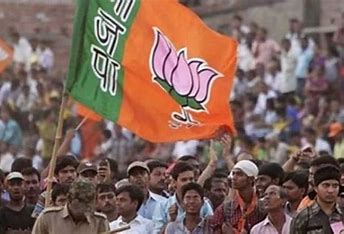The alliance between the two parties stretches back to 1984 and lasted till 2019.
Prior to the Lok Sabha elections, a jittery fragmented opposition rattled by a buoyant BJP’s claim to surpass the 400-mark had rallied together to demonstrate a show of unity. Three months later, post the anti-climax (the BJP that was projected to steamroller the opposition failed to get even a simple majority and the opposition did better than expected), political parties have reverted to their old ways and remain in a state of flux; uncertain and tentative about where and whom they should align with.
The show of unity is crumbling. AAP and Congress have parted ways in Haryana. In Delhi the Congress has vowed to go it alone and in UP, the upcoming by-polls have brought to the surface the natural discordance between the SP and Congress.
In this uncertain and volatile political climate pervading the country a realignment of forces may prove crucial especially in Maharashtra where an unlikely three-party triumvirate on either side is trying to forge a winning combination. The BJP must exploit this fluidity to rectify what is undoubtedly its biggest political blunder: the break-up with its long-time and ideological partner the Shiv Sena.
The alliance between the two parties stretches back to 1984 and lasted till 2019 when a miffed Uddhav Thackeray split from the BJP to become the Chief Minister with the help of the NCP and the Congress. The BJP-Shiv Sena partnership was a natural robust ideological alignment with both parties espousing the Hindutva cause. It was a win-win situation for both. There were times when the alliance did come under strain but the maturity displayed by leaders like Atal Behari Vajpayee, Advani and SS supremo Bal Thackeray was able to resolve the crises in the larger interest of both parties.
The parting of ways of the BJP and SS and subsequent split in the SS proved disastrous for the BJP in the Lok Sabha elections. It suffered an erosion of 25 seats. From a combined tally of 41 seats (BJP-23, SS-18) in 2019, its total dropped to a dismal 16 (BJP-9, SS-7). Had the alliance been in place, the Maharashtra results could have effectively countered even the losses in UP and brought the BJP closer to the 272-majority mark in the Lok Sabha. This is why I call the split between the BJP and the SS the biggest political blunder of the BJP in recent times.
The upcoming Assembly elections in Maharashtra presents an opportunity to rectify this gargantuan misstep. An unease among partners on both sides (MVP and Mahayuti) has created an uncertain political climate which can act as catalyst for the BJP to effect its strategy.
On the Mahayuti side, cracks have appeared in the relations between the BJP and the NCP (Ajit Pawar). A few months ago, an article in the RSS-affiliated weekly Vivek indicated that “workers of the BJP have not liked joining hands with the NCP” and more recently speaking at India Today Conclave the BJP Deputy Chief Minister Devendra Fadnavis blamed the non-transference of NCP votes for the poor performance of the BJP-NCP-Shiv Sena in the Lok Sabha polls. Likewise, Ajit Pawar and his men have been making noise about
On the MVP side, the Shiv Sena (UBT) finds itself in an unenvious position. It is facing the dilemma of diminishing importance. True the MVA alliance propped up Uddhav Thackrey for a brief period as Chief Minister but it was a case of political expediency: a move warranted to deny the BJP from coming to power rather than any true love for Uddhav Thackeray. That moment has passed. The NCP and Congress have no compunctions at this stage to bend over backwards to appease Uddhav Thackeray and they have made it clear by refusing to endorse Uddhav Thackeray as the CM candidate.
With regard to its electoral prospects, the Shiv Sena (UBT) is staring down a bleak path of uncertainty and even possible political extinction. The post SS split sympathy factor that made the SS (UBT) win 9 Lok Sabha seats is likely to be transient and will dissipate over time. The dilution of its Hindutva ideology stands in sharp contrast to the firebrand politics practiced by its founding leader Bal Thackeray—a factor that will lead to a further contraction in its voter base and a shift to the Eknath Shinde led Shiv Sena.
Even if by chance the SS(UBT) comes up with a strong showing in the Assembly elections, its numbers are very unlikely to reach levels that will place it in a commanding position. The chances of Uddhav Thackeray becoming the CM are next to nil and will be forced to play third fiddle to the NCP (Sharad Pawar) and the Congress. It is a lose-lose proposition for the Uddhav Thackeray group.
The need of the hour is for the two factions of the SS to reunite and for the BJP-SS alliance (natural partners) to be resurrected. It will be a win-win situation. An alliance of these natural partners will boost the morale of the BJP and SS cadres and increase the chances of victory for the duo in the upcoming elections. It will also add 9 more members to the NDA in the LS making the Modi government less vulnerable to the whims of unpredictable partners.
However, for this to happen, the SS (UBT) must jettison some advisors who have advocated a maximalist confrontational stance and the BJP on its part must dampen the political ambitions of some of its local leaders—factors that led to the split in the first place. Additionally, the BJP must promise the CM position to the SS for a full term of 5 years, with no caveats, as an olive branch for the mistake that it made—all in the larger interest of the party and the nation.

